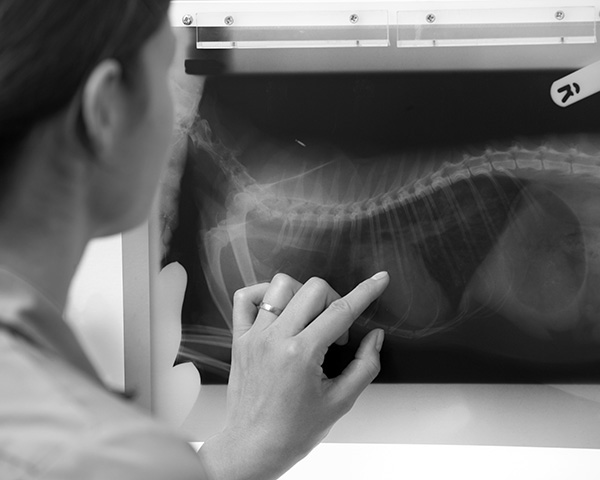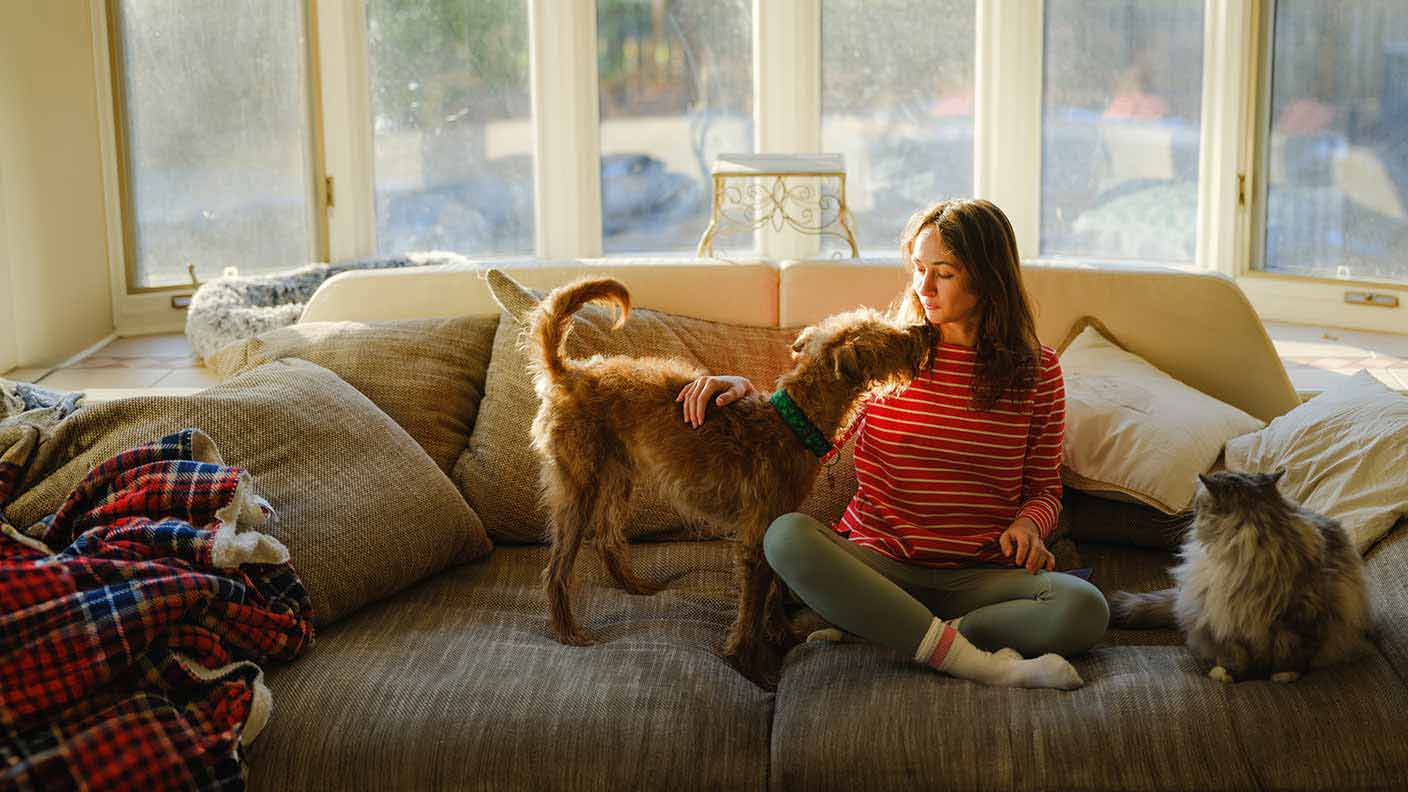Make your pet a creature of healthy habits
Whether you’re a newbie or an experienced pet parent, there’s little more you could wish for in your four-legged friend than good health.
So make sure your beloved pet stays bright-eyed and bushy-tailed by adopting our handy health habits.
Dog care tips
Your dog’s diet
Just like with any animal, it’s important to feed your dog a nutritious and well-balanced diet in line with its breed and exercise regime.
Feeding your dog a healthy diet can help increase its life expectancy and stop obesity, which is fast becoming more common in dogs and other pets.
There are dozens of feeding regimes available for all tastes and budgets, from dry complete diets and semi-moist dog food to biscuit mixes and homemade food.
When you protect your pooch with us, we could even cover up to 25% of the cost of a clinical diet for up to six months. You are covered – as long as the diet is recommended by your vet for a treatable condition other than obesity or weight loss.
Keep track of your dog
A missing pet is an upsetting and stressful experience for any owner. It’s best to think ahead about what you would do if your four-legged friend ever got lost or stolen.
Getting your dog microchipped is one of the best methods to help reunite you with your missing canine friend. All dogs over eight weeks old in the UK are required by law to be microchipped. If you don’t get your dog microchipped, you could face a fine of up to £500. And while pet insurance doesn’t cover the cost of microchipping, you can find out more information here.
Our theft and straying cover can reimburse you for any advertising expenses or rewards you’ve forked out to try and find your missing dog.
And if you’re unable to find your dog at all, we’ll reimburse the price you paid for them – up to the limit set out in your certificate of insurance.
Essential exercise
Daily exercise is essential for your dog’s physical and mental health. Not enough (or too much) exercise can lead to your dog being unhealthy and prone to illness or injury, so make sure you take it for a daily walk over a suitable distance for its breed.
A lack of exercise can also make your dog restless and bored, which can lead to attention-seeking behaviour such as destructive chewing, digging, scratching, barking and whining.
Grooming
Frequent grooming, including washing, brushing, trimming and treating parasites like fleas and ticks, may be necessary depending on the breed of your dog.
As a minimum, you’ll definitely need a brush, comb and shampoo. The type of brush you’ll need will depend on your dog’s breed and coat. For example, a bristle brush is best for short-haired dogs, whereas a pin brush is suitable for dogs with long, luscious locks.
While pet insurance can cover things like dental treatment and complementary treatment, we won’t cover any grooming or cosmetic treatments. For example cosmetic dentistry, cleaning and descaling of teeth, routine removal of dew claws, parasite control treatments or nail clipping.
Safety first
If you want to keep your dog safe and sound, it’s important to make sure it’s well trained.
Always supervise your dog, whether out in public or in the garden – and keep garden boundaries as secure as possible to prevent your dog from escaping.
If you do insure your dog with us, we’ll provide third party liability cover, which can help protect you if your dog accidentally injures someone or damages their property.
Puppy playtime
Encourage your puppy's problem-solving instincts with interactive chews and toys. You can also try giving your puppy toys it can roll around the floor, or create a scent-trail game by hiding dry treats for it to sniff out.
Travel
If you're travelling with your dog on public transport or in the car, make sure there’s plenty of ventilation and shade, and that fresh drinking water is readily available.
If you’ve got a long trip ahead, make regular stops to take your dog for a walk and let them answer calls of nature.
Holidays
If you’re going on holiday and planning on leaving your pup behind, make sure you’ve arranged alternative accommodation well in advance with friends, relatives or a boarding kennel.
Taking your furry friend with you? We’ll be on hand to help if anything goes wrong with cover for overseas vet fees and holiday cover available as standard with all our pet insurance policies.
Training
Making sure your dog is well-trained is essential to help it leave bad habits behind. And it can be a great bonding experience too.
Don't make training last any longer than around 15 minutes at one time, and try to do it in a familiar environment without too many distractions. Take it one command at a time and keep at it. Even if you're struggling, you'll get there eventually.
If you want professional advice or training, you can contact our 24/7 Vet Assistance service – our qualified vet nurses can give you expert training advice and recommend dog trainers.
Best behaviour
Promoting positive behaviour is part and parcel of our other health tips mentioned above, such as exercise, diet and training.
Most ‘bad’ behaviour starts at home, for example stealing food from the table or chewing on household items. This type of misbehaviour can often be caused by boredom and not getting enough attention, so make sure your dog feels like one of the family.
There are times when your dog’s bad behaviour could be more than just a phase though – and could be linked to a behavioural illness or disorder.
If that time comes, we could help cover the cost of behavioural therapy. And your furry friend will be back to being a good boy (or girl) in no time.
Cat care tips
Your cat’s diet
Getting your cat’s diet right is the key ingredient to keeping them happy and healthy.
A number of cat welfare charities, including the People's Dispensary for Sick Animals (PDSA), recommend that cats are fed pre-packaged complete cat food to get the correct balance of nutrients.
And when it comes to portion sizes, your cat’s age, weight and shape, alongside feeding guidelines and veterinary advice, should help you decide.
If you feed your cat a healthy, balanced diet – and focus on quality rather than quantity – you’ll have one content cat.
Keeping track of your cat
If your feline friend is ever lost or stolen, you’ll want to do everything you can to get it back. So make sure your cat has a collar attached with your name and address – and consider getting your cat microchipped too.
While we don’t cover the cost of microchipping, our theft and straying cover can help out if your cat wanders off.
General health
To keep your cat’s claws healthy, sharp and free from debris, a scratching post is a must-have. And if you want to keep your costs down, a bristly doormat securely fixed in an upright position will also do the trick.
While we don’t cover the costs of routine and preventative treatments, it’s worth taking measures to ensure your cat’s good health. Such as vaccinations, neutering and treatments to control parasites like fleas and worms.
Pet protection
Cats may be skilled at surviving, but with their playful nature and hunting instincts, it’s no surprise when they get into scrapes and fights with other felines.
The best option to protect them is to make sure you have adequate insurance in place. With a choice of time limited and lifetime cover, 24/7 vet support and extra savings and discounts, our cat insurance will leave you purring.
Feline fun
Cats are natural-born hunters – so keep yours entertained by giving it plenty of toys to chase and play with.
If you live in a rural location and the surrounding environment is safe, make sure you let them out for lots of exercise and fresh air too.
Grooming
Cats depend on their coats to protect them from the weather and keep their skin healthy, so cat hair care is essential.
Your cat will do its bit to preen and clean their coat, but you can help too by brushing, washing and de-fleaing it regularly.
When it comes to your cat insurance, we can cover things like dental treatment and complementary treatment. We won’t cover any grooming or cosmetic treatments, for example cosmetic dentistry, dew claw removal, parasite control treatments or nail clipping.
Rabbit care tips
A healthy rabbit diet
Domestic and wild rabbits are both herbivores, which means they have a plant-based diet. You should look to keep your pet rabbits’ diets as similar as possible to a wild rabbit's food diet.
The best diet for rabbits is a combination of hay and fresh water, with a sprinkling of quality pellets and fresh, leafy vegetables. Root vegetables and fruit can be given as the odd treat too – but only in small portions.
Giving rabbits the wrong food can cause a number of serious health and dental problems. So make sure you avoid things like cereal, chocolate, muesli, nuts and seeds.
If your rabbit does get sick, we could help cover the cost of a clinical diet (up to 25% for up to six months). You’ll be covered for this as long as the diet is recommended by your vet and it isn’t for obesity or weight loss.
Rabbit grooming
Most rabbits do a good job of grooming themselves, but that doesn’t mean you shouldn’t keep an eye on their appearance. Regular grooming will help keep your rabbit in tip-top condition and let you spend some quality time with them too.
So what are the main grooming requirements for rabbits? Well, for starters, you’ll need to keep on top of their teeth, ears, nails and coat.
Brushing their coat regularly will keep it in the best possible condition – and help prevent matting, hairballs and serious infections like flystrike. It’ll also give you a chance to feel for any lumps and bumps.
If you’re grooming long-haired rabbits, you’ll most likely need to brush their coat every day, and twice a day in warm weather.
Need some more advice on grooming your rabbit? Check out our guide to rabbit health and insurance and we’ll help make sure you’ve got a happy bunny at home.
Essential exercise
Like cats and dogs, rabbits need plenty of exercise to keep them happy and healthy. And that means you’ll have to give them plenty of safe space to run, dig and explore (and hop of course).
But how much exercise do rabbits need a day? Ideally, your rabbit should be spending as long as possible each day playing in a large, secure outdoor run or rabbit exercise pen.
If your rabbit doesn’t get enough exercise, it could quickly become bored and overweight – and their muscles and bones could become weak.
Playtime
Rabbits are social creatures that love play and attention. But they can also be nervous and timid animals at times. If you’re wondering how to play with rabbits, the best bet is to go at their pace – when and where they’re comfortable.
Your rabbit will likely spend most of their time running, hopping and jumping in their outdoor run or exercise pen. But what do rabbits like to play with when it comes to toys?
There are plenty of rabbit toys available in pet shops and supermarkets. But rabbits love playing with things like shredded paper and cardboard boxes and tubes, so there’s no need to fork out on expensive toys.
Training
When it comes to pets and obedience, we all know we need to train our dogs. But knowing how to train a rabbit probably isn’t something we’re all quite as familiar with.
Well the good news is that rabbits are incredibly clever creatures. And that means it’s fairly easy to train them (especially if they’ve been neutered).
It’s quick and simple to litter train rabbits, as they tend to do their business in the same place each time. And you can even train them to do tricks and run agility courses.
So whether you’re planning to keep your rabbit indoors or outdoors, a little training could make your life a whole lot easier.
24/7 Vet Assistance
If your pet cat, dog or rabbit is protected with us and you’ve questions about their health or wellbeing, take advantage of our Vet Assistance service.
Other helpful guides
All our handy guides are on hand to help keep your pet happy and healthy.

Pets and holidays
All you need to know about taking your pet on its hols

Pet insurance explained
Get to grips with the typical types of pet insurance

Get a pet-friendly home
Hints and tips to help create the perfect pet pad
Any questions?
Get the answer you’re looking for by checking out our pet insurance customers’ most common asked questions.
Ready to protect your pet?
If you’d like to get a quote for your pet insurance, you can get started right away. If you’re ready, we’re ready.
Need to talk to us?
Call 0344 543 1032.
We’re here Monday to Friday, 8am-6pm and Saturday, 9am-1pm. Calls are charged at local rates from landlines and mobiles and may be monitored and recorded.
Important information
Sainsbury's Bank plc, Registered Office, 33 Charterhouse Street, London, EC1M 6HA (registered in England and Wales, no 3279730) is authorised by the Prudential Regulation Authority and regulated by the Financial Conduct Authority and the Prudential Regulation Authority (register no. 184514).
Sainsbury's Supermarkets Ltd is an appointed representative of Sainsbury's Bank plc. Sainsbury's Bank plc acts as an introducer to Pinnacle Insurance Ltd who is authorised by the Prudential Regulation Authority and regulated by the Financial Conduct Authority and the Prudential Regulation Authority (register number 110866). Registered office: 4th Floor, Limelight, Elstree Way, Borehamwood, Hertfordshire, WD6 1JH. Sainsbury’s Bank Pet Insurance is arranged, administered and underwritten by Pinnacle Insurance Ltd. Sainsbury's Bank plc and Pinnacle Insurance Ltd are not part of the same corporate group.
We do not provide personal recommendations to customers.
